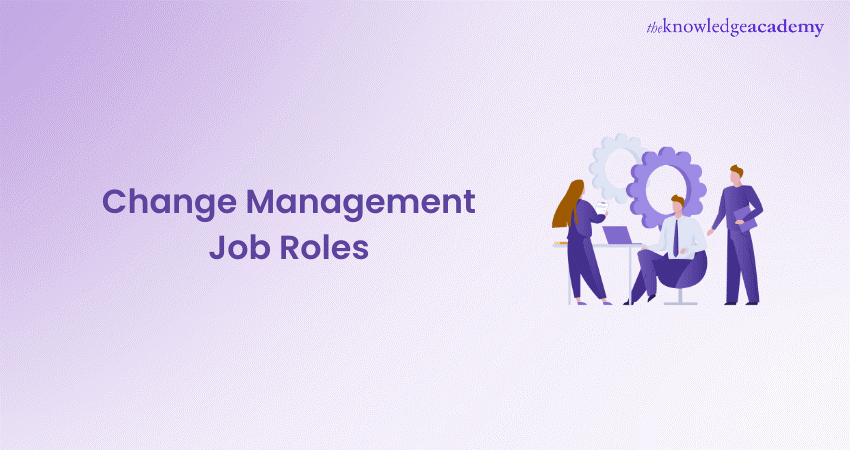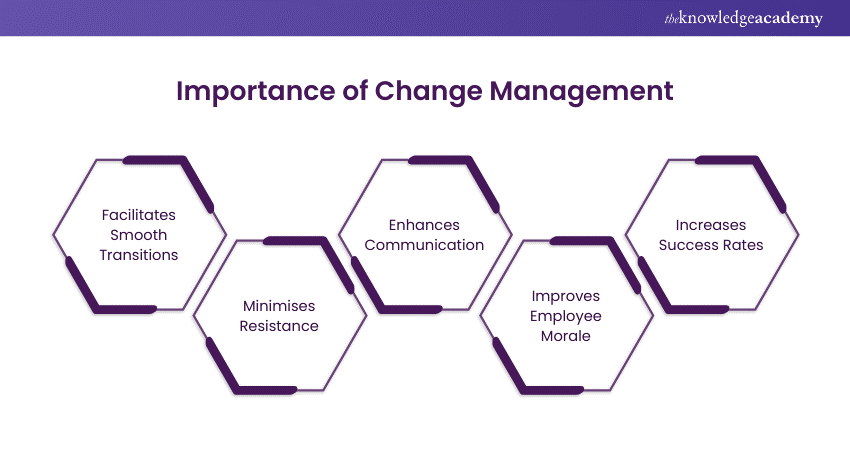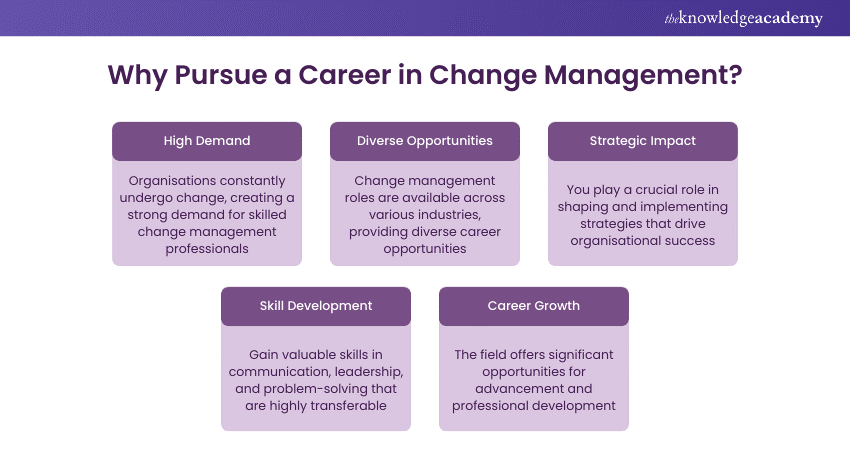We may not have the course you’re looking for. If you enquire or give us a call on +44 1344 203 999 and speak to our training experts, we may still be able to help with your training requirements.
We ensure quality, budget-alignment, and timely delivery by our expert instructors.

Imagine navigating a ship through turbulent waters; the crew’s roles and expertise are crucial to reaching the destination safely. Similarly, in the business world, the roles involved in Change Management are vital to steering an organisation smoothly through transitions. Understanding Change Management Job Roles is essential for anyone looking to drive successful change within a company.
Change Management Job Roles encompass a variety of positions, each with unique responsibilities that contribute to the overall change management process. From Change Managers and Project Leaders to Communication Specialists and Trainers, each role plays a critical part in ensuring that changes are implemented effectively and embraced by all stakeholders. Let’s delve into these roles to understand how they work together to facilitate seamless organisational change.
Table of Contents
1) What is Change Management?
2) Importance of Change Management
3) Job Roles Under Change Management
4) Additional Change Management Roles
5) Why Pursue a Career in Change Management?
6) Conclusion
What is Change Management?
Change Management is a structured approach aimed at facilitating the transition of individuals, teams, and organizations from a current state to a desired future state. This involves managing the human aspects of change using various change management models to ensure that employees adopt and embrace new processes, technologies, or cultural shifts effectively and sustainably.
Key elements include clear communication, training, and support to reduce resistance and foster a smooth transition. By addressing both the technical and emotional aspects of change, organisations can achieve their strategic objectives more efficiently and maintain operational stability during periods of transformation.
Importance of Change Management
Change Management is crucial for ensuring successful adaptation to new conditions and enhancing organizational efficiency. By systematically addressing the human side of change and applying key change management principles, it helps minimize resistance, reduce disruptions, and maintain productivity. Effective Change Management ensures that all stakeholders are aligned with the new direction, which increases the likelihood of achieving strategic goals.

It also fosters a culture of adaptability and continuous improvement, enabling organisations to respond proactively to market dynamics and maintain a competitive edge. Ultimately, Change Management is key to sustaining long-term success in a constantly evolving business environment.
Enhance your organisational skills with our comprehensive Change Management Certification. Register now!
Job Roles Under Change Management
Let’s take a look at different Job Roles under Change Management
Change Manager
Change Managers are pivotal in developing and implementing strategies for organisational transitions. They lead the communication and training efforts required to ensure that changes are adopted smoothly and with minimal disruption to operations. Their role involves assessing and managing the impact of change, identifying potential challenges, and working closely with stakeholders to address these issues.
Responsibilities of Change Manager:
a) Develop and implement structured Change Management strategies.
b) Lead and coordinate Change Management activities across the organisation.
c) Support communication and training initiatives to facilitate change.
d) Assess and manage the impact of change on the organisation.
e) Work closely with stakeholders to identify and address challenges.
f) Provide ongoing support and resources to employees during transitions.
g) Monitor progress and adjust strategies to ensure successful adoption.
Change Agents
Change Agents play a crucial role in facilitating organisational change by leveraging their networks and providing the necessary resources and support. They operate without formal authority but have a significant influence on the change process through their connections and ability to mobilise support.
Responsibilities of Change Agent:
a) Facilitate change within the organisation without formal authority.
b) Build and leverage strong organisational networks to support change.
c) Connect line managers with the necessary support and resources for change initiatives.
d) Ensure smooth communication and engagement in change processes.
e) Help overcome resistance and foster collaboration.
f) Provide access to necessary resources and information to support change.
g) Act as a liaison between different parts of the organisation during change initiatives.
Change Management Consultant
Change Management Consultants are experts who lead change projects from analysis to implementation, providing strategic advice and customised plans to help organisations navigate change effectively. They engage in colleague programmes, support sales initiatives, and develop strategies that minimise disruptions and ensure employees are supported throughout the transition.
Responsibilities of Change Management Consultant:
1) Lead Change Management projects from research and analysis to implementation.
2) Provide expert advice and strategies for effective Change Management.
3) Develop customised Change Management plans tailored to organisational needs.
4) Support and understand sales initiatives related to change.
5) Engage and lead colleague programmes to facilitate change adoption.
6) Minimise disruptions and ensure smooth transitions.
7) Provide ongoing support and resources to employees during the change process.
8) Monitor the effectiveness of change initiatives and make necessary adjustments.
Master the essentials of change with our Change Management Foundation and Practitioner Course. Join today!
Additional Change Management Roles
Let’s take a look at different additional Change Management Roles:
Change practitioners
Change Practitioners are responsible for executing Change Management strategies and plans. They work directly with teams to implement changes, ensuring smooth transitions and adoption. They focus on mitigating resistance, facilitating communication, and providing the necessary training and support to employees throughout the change process.
Responsibilities of Change Practitioners:
a) Execute Change Management strategies and plans.
b) Work with teams to implement changes.
c) Mitigate resistance and facilitate communication.
d) Provide training and support to employees during transitions.
Sponsors
Sponsors are senior leaders who provide the authority and resources for change initiatives. They ensure alignment with organisational goals, advocate for the change, and address any barriers. Sponsors play a crucial role in securing buy-in from other leaders and stakeholders.
Responsibilities of Sponsors:
a) Provide authority and resources for change initiatives.
b) Ensure alignment with organisational goals.
c) Advocate for the change within the organisation.
d) Address barriers and secure buy-in from stakeholders.
People managers
The role of people managers is to support their teams through change.They communicate the reasons and benefits of the change, provide support and guidance, and address any concerns. They also ensure that their teams have the necessary resources and training to adapt successfully.
Responsibilities of People Managers:
a) Support teams through change transitions.
b) Communicate reasons and benefits of the change.
c) Provide support, guidance, and address concerns.
d) Ensure teams have resources and training needed for adaptation.
Project Manager
Project Managers oversee the planning, execution, and completion of change projects. They ensure that projects meet their objectives, stay within budget, and are completed on time. They coordinate between different teams and stakeholders to ensure smooth implementation and resolve any issues that arise.
Responsibilities of Project Manager:
a) Oversee planning, execution, and completion of change projects.
b) Ensure projects meet objectives, budget, and timelines.
c) Coordinate between teams and stakeholders.
d) Resolve issues to ensure smooth implementation.
Unlock your potential with our Change Management Foundation Course.
Why Pursue a Career in Change Management?
Pursuing a career in Change Management offers numerous benefits and opportunities for professional growth. As a Change Management professional, you play a crucial role in guiding organisations through transitions, helping them adapt to new processes, technologies, and strategies. Change Management Interview Questions can also be vital in preparing for this role, helping you understand the key competencies needed. This role is essential for ensuring that changes are implemented smoothly and that employees are supported throughout the transition.

A career in Change Management provides the opportunity to develop a deep understanding of organizational behavior and the dynamics of change. You will gain skills in communication, leadership, and problem-solving, and become proficient with various change management tools, all of which are highly valued across various industries. Additionally, Change Management roles often involve working closely with senior leaders and stakeholders, offering the chance to influence strategic decisions and drive significant organisational improvements.
The demand for Change Management professionals is growing as organisations recognise the importance of effective Change Management in achieving their goals. This career path offers diverse opportunities, from working within a single organisation to consulting for multiple clients across different sectors. It also provides the satisfaction of seeing tangible results from your efforts, as you help organisations navigate complex changes and achieve their objectives.
Ready to lead change? Download the Change Management Manual and get started!
Conclusion
In conclusion, understanding the various Change Management Job Roles is essential for ensuring successful organisational transitions. From Change Managers to Change Management Consultants, each role plays a vital part in facilitating smooth and effective change, supporting employees, and achieving strategic goals.
Enhance your Change Management skills with our Complete Change Management Assessments Training.
Frequently Asked Questions
What is the Role of Employees in Change Management?

The role of employees in Change Management involves actively participating in the change process, providing feedback, and adopting new behaviours and practices. Their engagement and cooperation are crucial for the successful implementation and sustainability of change initiatives.
What is the Change Management Team Structure?

The Change Management team structure typically includes a Change Manager, Change Agents, and a Change Management Consultant. This team collaborates to develop strategies, implement changes, and support employees, ensuring effective communication and minimal disruption during transitions.
What are the Other Resources and Offers Provided by The Knowledge Academy?

The Knowledge Academy takes global learning to new heights, offering over 3,000 online courses across 490+ locations in 190+ countries. This expansive reach ensures accessibility and convenience for learners worldwide.
Alongside our diverse Online Course Catalogue, encompassing 19 major categories, we go the extra mile by providing a plethora of free educational Online Resources like News updates, Blogs, videos, webinars, and interview questions. Tailoring learning experiences further, professionals can maximise value with customisable Course Bundles of TKA.
What is The Knowledge Pass, and How Does it Work?

The Knowledge Academy’s Knowledge Pass, a prepaid voucher, adds another layer of flexibility, allowing course bookings over a 12-month period. Join us on a journey where education knows no bounds.
What are the Related Courses and Blogs Provided by The Knowledge Academy?

The Knowledge Academy offers various Change Management Certification, including the Change Management Foundation Course, Change Management Practitioner Course and Risk Management for Change Training. These courses cater to different skill levels, providing comprehensive insights into Operations Management.
Our Project Management Blogs cover a range of topics related to Change Management, offering valuable resources, best practices, and industry insights. Whether you are a beginner or looking to advance your Project Management skills, The Knowledge Academy's diverse courses and informative blogs have got you covered.
Upcoming Project Management Resources Batches & Dates
Date
 Change Management Foundation & Practitioner
Change Management Foundation & Practitioner
Mon 31st Mar 2025
Mon 26th May 2025
Mon 28th Jul 2025
Mon 22nd Sep 2025
Mon 24th Nov 2025






 Top Rated Course
Top Rated Course



 If you wish to make any changes to your course, please
If you wish to make any changes to your course, please


